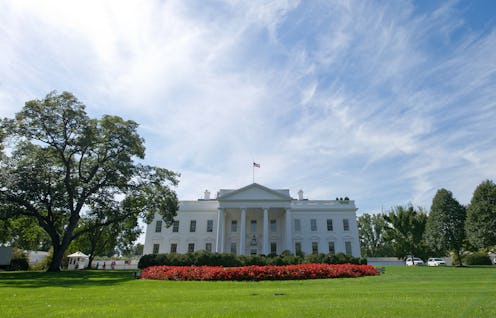News
The White House Tells Insurers Where It's At
President Barack Obama's Administration delivered a fabulous victory for women's healthcare rights Monday when it clarified that under the Affordable Care Act, insurers must cover all 18 FDA-approved birth control methods to women — without a copay, according to Planned Parenthood. This clarification comes after a troubling recent study by the National Women's Law Center (NWLC), which found that at least 33 insurers in 13 different states were forcing women under their plans to pay for birth control, according to Mother Jones. The badass clarification also insists that insurers must cover physician-recommended genetic testing for women with a history of breast, ovarian, or other gynecological cancers, and that it must cover preventive measures regardless of an individual's gender identity, according to the FAQ's on the U.S. Department of Labor website.
The NWLC report, released in late April, found violations "related to maternity care, birth control, breast-feeding support and supplies, genetic testing, well-woman visits, prescription drug coverage, care related to gender transition for transgender individuals, chronic pain treatment, and certain pre-existing conditions," according to the report. The NWLC's findings were consistent with a study conducted by the Kaiser Family Foundation. That earlier study found that, of 20 insurance carriers, only 11 provided completely free coverage of the emergency birth control pill ella, which has a longer window for effectiveness than progestin-based Plan B, according to Mother Jones.
But it's not just general preventive care and birth control that insurers have allegedly been illegally denying, according to the report. Insurers were also refusing care to transgender people either in transition or prior to their transition, even when physicians were recommending a specific type of care for those people. They can do this because of fuzzy, vague language under the law that grants insurers "reasonable management techniques," which could include anything to “control cost and promote efficient delivery of care," according to U.S. News & World Report. In reality, the techniques manifested in the form of outright rejection of care or a refusal to provide access (required under the law) to at least one form of contraception under each of the 18 FDA-approved methods, according to Planned Parenthood.
Unfortunately, this kind of behavior isn't exactly condemned when Republicans like former Arkansas Gov. Mike Huckabee have said that women who want free birth control are dependent on "Uncle Sugar," whoever that is. Huckabee gave a speech at the Republican National Committee's winter meeting in Washington, according to the Washington Post:
If the Democrats want to insult the women of America by making them believe that they are helpless without Uncle Sugar coming in and providing for them a prescription each month for birth control because they cannot control their libido or their reproductive system without the help of the government, then so be it. Let's take that discussion all across America.
Yep, that's what we women do. We walk around hoping to get something special from "Uncle Sugar" that men don't get (because condoms and vasectomies are covered for men).
In reality, women's healthcare is just expensive. Planned Parenthood pointed out that some women were paying $600 or more for access to just birth control. One month of the generic birth control pill, Lutera can cost $19 to $40, according to Credit.com. Multiply that by 12 and add in any uncovered visits to the lady doctor or special procedures and you've got a hefty sum that could have gone toward student loans, food, shoes, etc.
More importantly, free access to birth control makes sense economically. Planned Parenthood cited a 2014 economic study that found that "individuals born in the years immediately after the federal family planning programs started were less likely to live in poverty in childhood and adulthood." A separate study by the Guttmacher Institute found that more young women obtained at least some college education and more college-educated women pursued advanced professional degrees when they had access to contraception. This is no longer a question of whether contraception access is good for women. Gretchen Borchelt, the NWLC's VP for Health and Reproductive Rights, released a statement on the administration's clarification:
Insurance companies have been breaking the law and, today, the Obama administration underscored that it will not tolerate these violations. It is now absolutely clear that all means all — all unique birth control methods for women must be covered.
Image: Getty Images (2)
